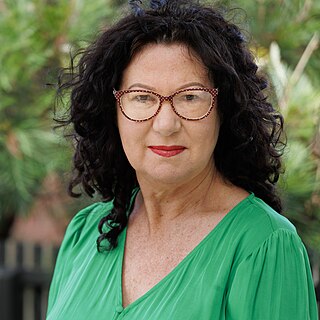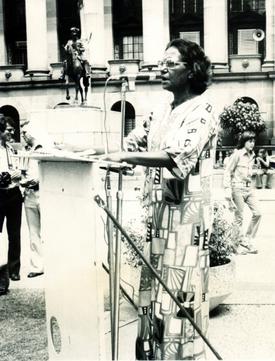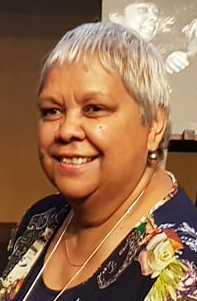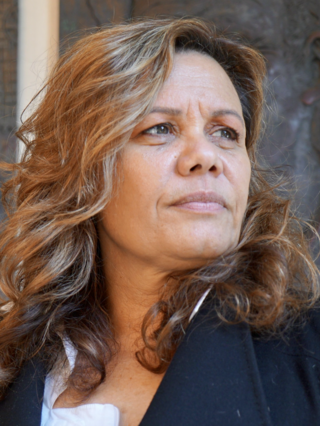Related Research Articles

Jane Harrison is an Australian First Nations playwright,novelist,literary festival director and researcher.

Oodgeroo Noonuccal ( UUD-gə-roo NOO-nə-kəl;born Kathleen Jean Mary Ruska,later Kath Walker was an Aboriginal Australian political activist,artist and educator,who campaigned for Aboriginal rights. Noonuccal was best known for her poetry,and was the first Aboriginal Australian to publish a book of verse.
Murri is a demonym for Aboriginal Australians of modern-day Queensland and north-western New South Wales. For some people and organisations,the use of Indigenous language regional terms is an expression of pride in their heritage. The term includes many ethno-linguistic groups within the area,such as the Kamilaroi (Gamilaraay) and Yuggera (Jagera) peoples.

Larissa Yasmin Behrendt is an Australian legal academic,writer,filmmaker and Indigenous rights advocate. As of 2022 she is a professor of law and director of research and academic programs at the Jumbunna Institute for Indigenous Education and Research at the University of Technology Sydney,and holds the inaugural Chair in Indigenous Research at UTS.

Marcia Lynne Langton is an Aboriginal Australian writer and academic. As of 2022 she is the Redmond Barry Distinguished Professor at the Melbourne School of Population and Global Health,University of Melbourne. Langton is known for her activism in the Indigenous rights arena.

Anita Marianne Heiss is an Aboriginal Australian author,poet,cultural activist and social commentator. She is an advocate for Indigenous Australian literature and literacy,through her writing for adults and children and her membership of boards and committees.

Henrietta Marrie is a Gimuy Walubara Yidinji elder,an Australian Research Council Fellow and Honorary Professor with the University of Queensland.

Malarndirri Barbara Anne McCarthy is an Indigenous Australian politician and former journalist who has been a Senator for the Northern Territory since 2016. She is the Minister for Indigenous Australians in the Albanese Government since 29 July 2024. She previously served in the Northern Territory Legislative Assembly.

Jacqueline Gail "Jackie" Huggins is an Aboriginal Australian author,historian,academic and advocate for the rights of Indigenous Australians. She is a Bidjara/Pitjara,Birri Gubba and Juru woman from Queensland.
Marlene Cummins is a jazz blues singer,saxophonist,songwriter,artist,Aboriginal Australian activist,broadcaster,dancer,and actor. Many activists consider her to be Australia's Angela Davis.

The Yugambeh,also known as the Minyangbal,or Nganduwal,are an Aboriginal Australian people of South East Queensland and the Northern Rivers of New South Wales,their territory lies between the Logan and Tweed rivers. A term for an Aboriginal of the Yugambeh tribe is Mibunn,which is derived from the word for the Wedge-tailed Eagle. Historically,some anthropologists have erroneously referred to them as the Chepara,the term for a first-degree initiate. Archaeological evidence indicates Aboriginal people have occupied the area for tens of thousands of years. By the time European colonisation began,the Yugambeh had a complex network of groups,and kinship. The Yugambeh territory is subdivided among clan groups with each occupying a designated locality,each clan having certain rights and responsibilities in relation to their respective areas.
Ellen van Neerven is an Aboriginal Australian writer,educator and editor. Their first work of fiction,Heat and Light (2013),won several awards,and in 2019 Van Neerven won the Queensland Premier's Young Publishers and Writers Award. Their second collection of poetry,Throat (2020),won three awards at the 2021 New South Wales Premier's Literary Awards,including Book of the Year.
Cindy Anne-Maree Shannon is an Australian academic best known for her work in the field of Indigenous health.

Shaun Davies is an Aboriginal Australian language activist,linguist,radio personality,and actor. He is known for his advocacy work with the Yugambeh language and culture,as well as appearances in various media.

Patricia O'Connor is an Australian Aboriginal elder of the Yugambeh people. She is known for her work in reviving the Yugambeh language and opening the Yugambeh Museum. In 2014 she received the NAIDOC Award for Female Elder of the Year,and in 2019 she was named a Queensland Great.

Yvonne Weldon is an Australian local government politician. She was elected deputy chairwoman of Metropolitan Local Aboriginal Land Council and was the first Aboriginal candidate for Lord Mayor of the City of Sydney in 2021 and is running again in 2024. She is the first Aboriginal councillor elected in the City of Sydney.

Ysola Mary Best was an Australian author and elder of the Yugambeh people. Best is known for her works and role in preserving the language,history and culture of the Yugambeh. She wrote about aboriginal culture and history. Most of her published works are about the Yugambeh language group of South East Queensland.
Bronwyn Fredericks is an Indigenous Australian academic and administrator. Her scholarship extends across education,health,community development,policy,and Indigenist research methods,including a focus on work relevant to Aboriginal and Torres Strait Islander people using participatory and community led approaches. Her contributions have been recognised through the NAIDOC Education Award in 2022 and the Aboriginal and Torres Strait Islander Health Award in 2019. She is currently the Deputy Vice Chancellor at the University of Queensland.
Maree Toombs is a Euralayie and Kooma woman from north-western NSW and a researcher in Aboriginal and Torres Strait Islander health,particularly mental health and respiratory disease. Her work emphasises the importance of co-design,and she is editor of the book Indigenous Australians and Health:The Wombat in the Room, which guides health professionals working with Aboriginal and Torres Strait Islander Australians. She is Professor of Aboriginal and Torres Strait Islander Health in the UNSW School of Population Health,and Professor of Public Health at the University of Sydney.
References
- 1 2 3 4 "Dr Chelsea Bond". NAIDOC. Archived from the original on 29 December 2021. Retrieved 29 December 2021.
- 1 2 "Dr Chelsea Watego". University of Queensland. 9 November 2015. Retrieved 30 December 2021.
- 1 2 "Chelsea Joanne Ruth Watego v State of Queensland, TWG, UXH" (PDF).
- ↑ Bond, Chelsea (24 November 2016). McInerney, Marie (ed.). "Letter to my former self: 7 insights for becoming an ethical Indigenous researcher". Croakey Health Media. Retrieved 30 November 2021.
- ↑ Bond, Chelsea (27 January 2015). "Chelsea Bond: Australia Day ought to be for everyone". The New Zealand Herald . Retrieved 30 December 2021.
- ↑ Bond, Chelsea (28 April 2020). "Dear Ancestor". In Whittaker, Alison (ed.). Fire Front: First Nations poetry and power today. University of Queensland Press. pp. 3–8. ISBN 9780702263880.
- ↑ "Through American Eyes". Foreign Correspondent . 26 June 2017. ABC TV.
- 1 2 "Another Day in the Colony by Chelsea Watego". University of Queensland Press . Retrieved 30 December 2021.
- ↑ Moon, Emerald; Ballard, Tom (22 January 2022). "09: AMA about how Straya Day and the GST suck (ft. Chelsea Watego)". Serious Danger (Podcast). Retrieved 30 January 2022.
- ↑ Bond, Chelsea (28 August 2007). ""When you're black, they look at you harder": narrating Aboriginality within public health". University of Queensland . Retrieved 29 December 2021.
- 1 2 "Associate Professor Chelsea Bond". University of Queensland. Archived from the original on 29 December 2021. Retrieved 29 December 2021.
- 1 2 Watego, Chelsea (Spring 2021). "Always Bet on Black (Power)". Meanjin . Retrieved 30 December 2021.
- 1 2 "Project aims to develop advanced health outcomes for Indigenous peoples". Mirage.News. 21 July 2021. Retrieved 29 December 2021.
- ↑ "Professor Chelsea Watego". Institute for Collaborative Race Research. Archived from the original on 29 December 2021. Retrieved 30 December 2021.
- ↑ "Emerging Aboriginal and Torres Strait Islander Researcher Award". Lowitja Institute. Archived from the original on 29 December 2021. Retrieved 29 December 2021.
- ↑ "Professor Chelsea Watego". Queensland University of Technology . Retrieved 30 December 2021.
- ↑ Bond, Chelsea (28 June 2017). "Class is the new black: The dangers of an obsession with the 'Aboriginal middle class'". ABC News . Retrieved 30 December 2021.
- ↑ Watego, Chelsea (5 November 2021). "Chelsea Watego: "Our Blackness was not a source of shame but a source of pride"". SBS . Retrieved 29 December 2021.
- ↑ "NEWS". Horne Prize. Archived from the original on 10 March 2020. Retrieved 30 December 2021.
- ↑ "Dr Chelsea Bond". Australian Audio Guide. Retrieved 30 December 2021.
- ↑ Trevor Noah refuses to apologise for sexual joke about Aboriginal women. NITV. 24 August 2018. Retrieved 30 December 2021.
- ↑ Heiss, Anita [@AnitaHeiss] (22 July 2018). "I had to prepare myself to watch. Save yourself. It's disgusting and offensive. The man has no idea" (Tweet). Archived from the original on 29 December 2021. Retrieved 29 December 2021– via Twitter.
- ↑ Bond, Chelsea (25 August 2018). "Aboriginal women are Black women too". NITV . Retrieved 30 December 2021.
- ↑ Pearson, Luke; Cromb, Nat (15 April 2019). "Dr Chelsea Bond delivers a masterclass in Indigenous Excellence". IndigenousX . Retrieved 30 December 2021.
- ↑ Daley, Paul (18 December 2021). "'We have yet to reach our postcolonial moment': Chelsea Watego on colonialism and the canon". The Guardian . Retrieved 30 December 2021.
- ↑ Fry, Declan (26 November 2021). "Another Day in the Colony by Chelsea Watego review – a fierce manifesto for First Nations to flourish". The Guardian . Retrieved 29 December 2021.
- ↑ Nicholson, Kara (2 November 2021). "Another Day in the Colony". Readings. Retrieved 29 December 2021.
- ↑ Cregan, Ellen; Gill, Mindy; Grbec, Monique; Murphy, Fiona (18 November 2021). "Books Roundup: Permafrost, Scary Monsters, Another Day in the Colony, How to End a Story". Kill Your Darlings . Retrieved 29 December 2021.
- ↑ Burke, Kelly (8 September 2022). "Queensland Literary awards: winners list reflects 'a moment of change for the nation'". The Guardian. Retrieved 8 September 2022.
- ↑ "2022 Queensland Literary Awards shortlists". State Library of Queensland. Retrieved 3 August 2022.
- ↑ "Victorian Premier's Literary Awards Shortlist Announced". Creative Victoria. 8 December 2021. Archived from the original on 29 December 2021. Retrieved 30 December 2021.
- ↑ "Prime Minister's Literary Awards 2022 shortlists announced". Books+Publishing. 7 November 2022. Retrieved 8 November 2022.
- ↑ "The Stella Prize longlist 2022". Readings. 28 February 2022. Retrieved 28 February 2022.
- ↑ "Another Day in the Colony". State Library of NSW. 1 February 2023. Retrieved 1 March 2023.
- ↑ "Another Day in the Colony". State Library of NSW. 1 February 2023. Retrieved 1 March 2023.
- ↑ Jenkins, Keira (6 September 2022). "Racial discrimination case launched against state of Queensland by Professor Chelsea Watego". NITV. Retrieved 20 October 2022.
- ↑ Damjanovic, Dijana (11 October 2022). "Professor Chelsea Watego loses racism case but doesn't want others to be discouraged". NITV. Retrieved 20 October 2022.
- ↑ "Watego v State of Queensland and ors (costs) QCAT 292" (PDF). archive.sclqld.org.au. 2023.
- ↑ Mallapaty, Smriti (19 October 2022). "'There's no space for us': an Indigenous-health researcher battles racism in Australia". Nature. Retrieved 20 October 2022.